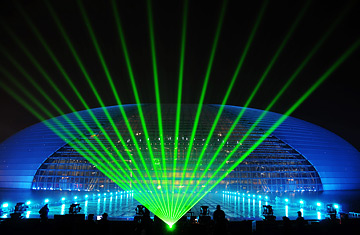
The National Center for the Performing Arts building in Beijing, China
As the principal guest conductor at the Metropolitan Opera House for the past decade, Maestro Valery Gergiev of the Kirov Opera has developed a global group of admirers for the epic Russian operas he has resurrected. Indeed, Gergiev was scheduled to take the stage at the Met this Christmas, but then Beijing called. They wanted him to open the first performance season of China's highest palace of performance, the $40 million National Grand Theater, better known in Beijing by its shape, as the "egg." The building, designed by the French architect Paul Andreu, is a gleaming dome with a subtle ying-yang design, surrounded by water and one of the most distinctive new buildings in a city consciously trying to turn itself into a 21st century metropolis.
No artist could decline the invitation. Gergiev and hundreds of singers and musicians (and two horses) were flown in from the Mariinsky Theater in St. Petersburg. And on Christmas night, they presented Alexander Borodin's classic opera Prince Igor on a world-class stage — alas, to an audience that paid little attention.
"Gergiev was great, the performance was immaculate, and the acoustic effect of the theatre is truly amazing," says Liu Xuefeng, a music critic and editor of the Chinese edition of Gramophone, the British classical music magazine. But there was a downside to the perfect sound system. "I could hear every word from the stage as well as from my fellow audience members ten seats away from me," says Liu. "Chattering, eating, children crying, camera flashes going off here and there... It was the worst audience I have ever seen!" The four-hour opera had already been shortened to slightly over three hours for the Chinese. But a collective sigh of relief from the audience was audible when intermission came. By the end of the play, only 60% of the full house remained.
Liu considered himself lucky to have the opportunity to watch this classic. The estimated 2,000 tickets available for Prince Igor ranged from just 300 seats at the cheapest price (380 Renminbi or close to $50, a huge amount for ordinary citizens) to 122 VIP seats (at the Olympiad-alluding price of 2,008 RMB or $250). Almost all sold out in no time, apart from those set aside for government officials. "I think only 10% of the audience are true music lovers," said a man surnamed Song, who hovered around the theatre in freezing temperatures hoping to find a cheap ticket from the scalpers. "People think going to western operas and classical music concerts is a sign of a certain social status, and the National Grand Theatre is also a novelty to them. I doubt many of them really understand opera."
Liu Xuefeng is hardly able to hide his chagrin. Such dilettante and often crass audiences are giving the music he loves a bad name. "People think of classical music lovers as pretentious dabblers," says Liu. Successful ticket sales for performances by international groups in China are hardly based on the audience's passion and understanding of music — just on the prestige of the performers. Tickets to the London Philharmonic Orchestra and the Berlin Philharmonic in January were snatched up as soon as they became available. In fact, the high cost of tickets for top-quality concerts keep many music lovers away — and encourage the nouveau riche to attend and yawn in their expensive seats.
It is something the people who run the "egg" recognize. The National Grand Theater has launched a project entitled "Opening the Door to Art Education," consisting of a series of lectures on western classical music. "It will take time," Liu says, "Maybe China is developing a bit too fast," on the track to a sizzling economy and unheard of wealth. "Art is having a hard time keeping up."
